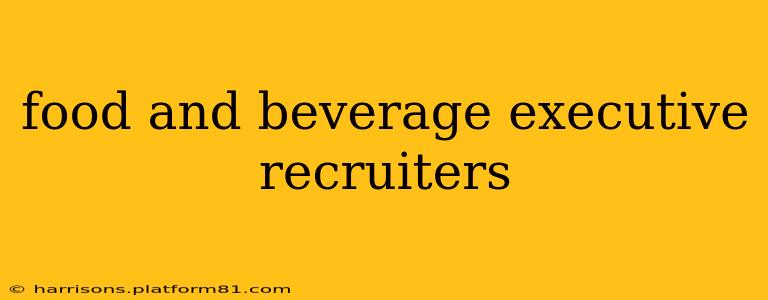The food and beverage industry is dynamic, demanding, and fiercely competitive. Finding the right executive leadership can be the difference between success and stagnation. This is where specialized food and beverage executive recruiters come in. They possess the industry knowledge and network to connect companies with top-tier talent capable of navigating the unique challenges and opportunities of this exciting sector. This comprehensive guide explores the vital role of these recruiters, how to choose the right one, and what to expect from the process.
What Do Food and Beverage Executive Recruiters Do?
Food and beverage executive recruiters specialize in placing high-level professionals in roles such as CEOs, CFOs, COOs, and other C-suite positions, as well as vital leadership roles within specific departments like operations, marketing, and product development. They go beyond simply matching resumes to job descriptions; they understand the nuanced requirements of the industry, considering factors like:
- Culinary expertise: For chef-related roles, recruiters need a strong grasp of culinary techniques, menu development, and kitchen management.
- Operational efficiency: Understanding supply chain management, inventory control, and cost optimization is crucial for roles overseeing restaurant operations.
- Regulatory compliance: Navigating food safety regulations, licensing, and permits is paramount.
- Brand building and marketing: Recruiters must understand the intricacies of brand development, marketing strategies, and customer relations within the food and beverage space.
- Financial acumen: Understanding profit margins, budgeting, and financial forecasting is essential, particularly for senior management roles.
They utilize their extensive networks, built over years of experience, to identify and attract passive candidates—top performers who aren't actively seeking new opportunities but might be open to the right challenge.
How to Choose the Right Food and Beverage Executive Recruiter?
Selecting the right recruiter is a critical step. Here’s what to consider:
- Industry Specialization: Look for recruiters with a proven track record specifically within the food and beverage sector. Generalist recruiters may lack the necessary industry-specific knowledge.
- Network and Reach: A recruiter’s network is their most valuable asset. Inquire about their connections within the food and beverage industry and their success rate in placing candidates in similar roles.
- Candidate Quality: Ask for examples of successful placements and testimonials from past clients. This will offer insight into the caliber of candidates they typically represent.
- Understanding of Your Needs: A good recruiter will take the time to understand your company’s culture, values, and specific requirements for the role. They should actively listen and ask clarifying questions.
- Fees and Transparency: Clarify the recruiter’s fee structure upfront. Reputable recruiters are transparent about their fees and payment terms.
What to Expect from the Recruitment Process?
The process typically involves:
- Initial Consultation: Discuss your company's needs, the desired candidate profile, and the recruitment timeline.
- Candidate Search: The recruiter will use their network and resources to identify potential candidates.
- Candidate Screening: Shortlisting candidates based on their experience, skills, and qualifications.
- Interviews: Facilitating interviews between your company and potential candidates.
- Negotiations: Assisting with salary negotiations and offer letters.
- Onboarding: Sometimes, recruiters provide support in the onboarding process to ensure a smooth transition for the new hire.
What are the different types of Food and Beverage businesses that Executive Recruiters work with?
Executive recruiters in the food and beverage industry work with a wide array of businesses, from small, independent restaurants to large multinational corporations. This includes fine dining establishments, casual restaurants, fast-food chains, breweries, wineries, distilleries, food processing companies, catering services, and even food tech startups. The diversity of the industry ensures a varied client base for these recruiters.
How much do Food and Beverage Executive Recruiters charge?
The fees charged by executive recruiters typically range from 20% to 30% of the hired candidate's first-year compensation. This percentage can vary depending on the seniority of the role, the difficulty of the search, and the recruiter's experience. It's crucial to discuss the fee structure transparently before engaging a recruiter.
What are the key skills and experience a Food and Beverage Executive Recruiter should have?
A successful food and beverage executive recruiter should possess a deep understanding of the industry, including knowledge of culinary operations, marketing, finance, and regulatory compliance. Years of experience within the industry or recruiting within the industry are invaluable. Strong networking skills, excellent communication, and the ability to effectively match candidates to client needs are also essential.
What is the difference between a generalist recruiter and a specialized food and beverage executive recruiter?
While a generalist recruiter can potentially handle a food and beverage search, a specialized recruiter possesses a deeper understanding of the industry's nuances, contacts within the industry's network, and knowledge of specialized skills and experience required for roles within the sector. This specialized knowledge translates to a more efficient and successful recruitment process.
Finding the right leadership is paramount to success in the competitive food and beverage world. By partnering with a skilled and specialized executive recruiter, your organization can significantly improve its chances of attracting and hiring top talent, ultimately driving growth and profitability. Remember to carefully vet potential recruiters to ensure a smooth and effective recruitment process.
